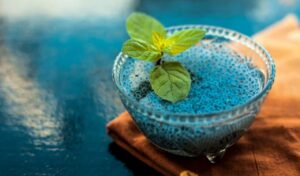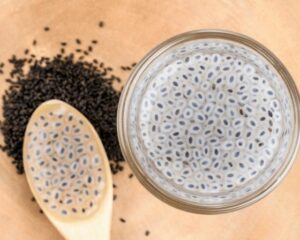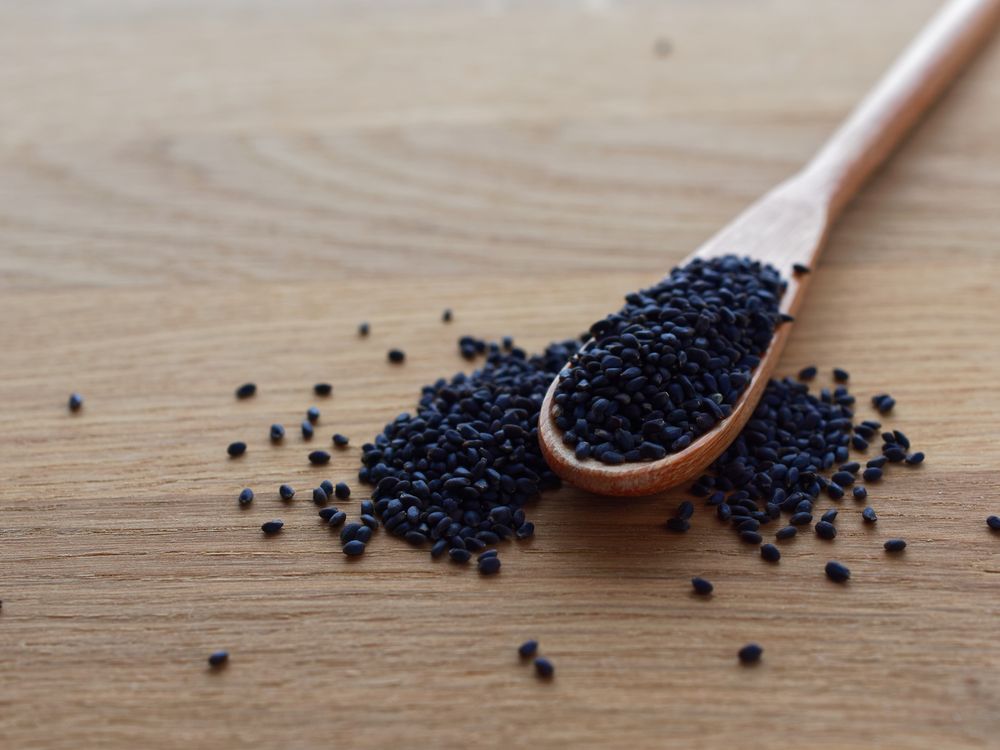Do you want to lose weight in a healthy and sustainable way? If so, you should consider adding sabja seeds to your diet. Sabja seeds are small, a black seed that is packed with nutrients and has some amazing health benefits. In this blog post, we will discuss the benefits of sabja seeds, as well as some recipes that you can use to add to your diet. We will also talk about the potential side effects of sabja seeds, so you can make an informed decision before adding them to your diet.
Contents
What Are Sabja Seeds?
 Sabja seeds are the black seeds of the sweet basil plant. The scientific name for sweet basil is Ocimum sanctum. It’s a member of the mint family and is native to India and other tropical regions.
Sabja seeds are the black seeds of the sweet basil plant. The scientific name for sweet basil is Ocimum sanctum. It’s a member of the mint family and is native to India and other tropical regions.
These seeds are also known as tukmaria seeds, black chia seeds, or falooda seeds. They’ve been used in Ayurvedic and Chinese medicine for centuries. In India, they are native but different from holy basil – that is known as Tulsi.
While they’re relatively unknown in the Western world, sabja seeds are gaining popularity as a health food. They’re often used in India as a cooling agent during the hot summer months. But one thing to remember is, that sabja seeds cannot consume in large quantities as they can give you diarrhea.
According to studies, these seeds are better than chia seeds and absorb more water. This makes them a great tool for weight loss. When soaked in water, they form a gel-like substance that can help you feel fuller for longer periods of time.
What Are The Nutrients In Sabja Seeds?
Sabja seeds are a good source of fiber, protein, essential fatty acids, vitamins, and minerals. According to research, 100 grams of basil seeds from India contains:
- 14.8 grams of protein
- 13.8 grams of lipids
- 63.8 grams of carbs
- 22.6 grams of fiber
Along with these nutrients, the other minerals in the same serving contain:
- 2.27 mg of iron
- 31.35 mg of magnesium
- 1.58 mg of zinc
Studies suggest that Indian basil seeds contain 442 calories roughly. So, the nutrients present in these seeds can help you with your weight-loss goals.
Sabja seeds are also a good source of antioxidants. These nutrients scavenge harmful toxins and byproducts that can damage cells, leading to inflammation. The antioxidants present in sabja seeds may help to protect cells and reduce the risk of some chronic diseases.
So, if you are looking for a healthy and nutritious way to lose weight, then you should definitely try sabja seeds. Just remember to soak them in water for a few minutes before eating them. Do not eat them raw as they may cause indigestion. Sabja seeds are also known as sweet basil seeds and are commonly used in Indian desserts.
What Are The Benefits of Sabja Seeds?
 Sabja seeds are often touted as a weight-loss miracle, but do they really live up to the hype? Let’s take a closer look at the science behind this superfood to see if it can really help you shed those extra pounds. here are some of the most impressive benefits of sabja seeds:
Sabja seeds are often touted as a weight-loss miracle, but do they really live up to the hype? Let’s take a closer look at the science behind this superfood to see if it can really help you shed those extra pounds. here are some of the most impressive benefits of sabja seeds:
Good source of fiber
This is one of the most important benefits of sabja seeds. fiber helps to keep you feeling full after eating, so you’re less likely to reach for unhealthy snacks later on. Just one tablespoon of these tiny seeds contains nearly three grams of fiber. So, this natural herb can definitely help to suppress your appetite and promote weight loss.
Helps control blood sugar levels
Another benefit of sabja seeds is that they can help to regulate blood sugar levels. This is especially beneficial for those who suffer from diabetes or insulin resistance. When blood sugar levels are balanced, it can help to reduce cravings and the likelihood of overeating. Also, sugar levels that are too high can lead to weight gain, so keeping them balanced is crucial for healthy weight loss.
Aids in digestion
Sabja seeds are also beneficial for digestion. They help to promote regularity and prevent constipation. The fibers in the seeds also help to absorb toxins and remove them from the body. This can lead to better gut health and a reduction in the risk of gastrointestinal issues. Sabja seeds are also a good source of antioxidants. These nutrients can help to protect cells from damage and reduce the risk of some chronic diseases.
Good for skin and hair
It is believed that sabja seeds can also help in improving your skin complexion and making your hair shinier. They are also effective in treating dandruff, scalp itchiness, and hair fall.
To use them for your hair, soak a handful of seeds in water overnight and strain the water in the morning. Use this water to rinse your hair after shampooing. They are also used in many hair oil formulations.
You can also make a face pack by mixing sabja seeds with Multani mitti and rose water. Apply it on your face and wash it off after 15 minutes for soft and glowing skin. So this can be really helpful if you are looking for skin tightening remedies.
Relieve constipation and bloating
This is one of the most common sabja seed benefits. Soak a tablespoon of the seeds in a cup of water for about 15 minutes. Once they have swollen, drink the mixture. Doing this once or twice a day will help to relieve constipation and bloating effectively. The fiber in sabja seeds also helps to regulate bowel movements and keeps things moving along smoothly.
Aids weight loss
 Sabja seeds for weight loss are actually quite effective. When soaked in water, they absorb the liquid and expand, creating a feeling of fullness in the stomach. This helps to reduce overall calorie intake and promote weight loss. Additionally, the high fiber content of sabja seeds can help to regulate digestion and prevent constipation, both of which are also helpful for weight loss.
Sabja seeds for weight loss are actually quite effective. When soaked in water, they absorb the liquid and expand, creating a feeling of fullness in the stomach. This helps to reduce overall calorie intake and promote weight loss. Additionally, the high fiber content of sabja seeds can help to regulate digestion and prevent constipation, both of which are also helpful for weight loss.
So, these are some numerous benefits and overall quality of life improvements that these basil seeds can bring. Moreover, they are extremely easy to add to your diet as they can be used in a variety of recipes. Consider including these seeds in your diet and reaping the benefits for yourself!
Are There Any Side Effects?
The side effects of sabja seeds are usually minimal. The most common side effects are:
- Digestive upset, such as bloating, gas, or diarrhea.
- Nausea and vomiting
- Acnes
- Acid reflux
- Headache
- Abdomen discomfort
- May loss of appetite
These are some common side effects but very rarely people may face serious side effects like:
- Allergic reactions
- Hives
- Swelling of the face, lips, tongue, or throat
- Difficulty breathing or swallowing
- Dizziness
- Fast heartbeat
If you experience any of these symptoms, stop taking sabja seeds and seek emergency medical attention. Sabja seeds are generally considered safe and these impacts occur when you overdose or are intolerant to this food.
Pregnant and breastfeeding women should avoid consuming sabja seeds as there is not enough research to determine if it’s safe for them. If you have any concerns, speak with your healthcare provider before adding sabja seeds to your diet.
Are There Any Precautions?
 There are some precautions that you should take when consuming sabja seeds. For example, if you are pregnant or breastfeeding, it is best to avoid consuming sabja seeds. Additionally, if you have diabetes, high blood pressure, or any other chronic medical condition, please consult with your doctor before adding sabja seeds to your diet.
There are some precautions that you should take when consuming sabja seeds. For example, if you are pregnant or breastfeeding, it is best to avoid consuming sabja seeds. Additionally, if you have diabetes, high blood pressure, or any other chronic medical condition, please consult with your doctor before adding sabja seeds to your diet.
As with any new food that you introduce into your diet, it is always best to start with a small amount to see how your body reacts. Some people may experience bloating or gas after consuming sabja seeds. If this occurs, simply reduce the number of seeds that you consume or discontinue use altogether.
Basil seeds are generally considered safe for most people when consumed in moderation. However, as with any food, there is always the potential for allergic reactions. If you experience any adverse reactions after consuming sabja seeds, please discontinue use and consult with your doctor.
Therefore these are some things that you should take into consideration before consuming this herb. Overall, they are a healthy addition to your diet and may help with weight loss; however, please consult with your doctor before making any drastic changes to your diet.
What Are Some Recipes You Can Try With Sabja Seeds?
If you’re looking to add sabja seeds to your diet, there are a few different recipes you can try. Some of these include:
Add them to smoothies or juices
This is something many people do as it’s an easy way to get the benefits of these seeds without really changing up your diet. Just throw a few in with your regular smoothie ingredients and you’re good to go! In fact, using these seeds in smoothies is a great way to help you lose weight as they can help keep you feeling full for longer.
Make them into a tea
This is another easy way to consume sabja seeds and one that many people enjoy. Just steep the seeds in hot water for a few minutes and then drink up! You can also add some honey or lemon to taste if you like.
Add them to oatmeal or porridge
If you’re looking for a hearty breakfast that will keep you full all morning, try adding sabja seeds to your oatmeal or porridge. Just cook the oats as normal and then stir in a few seeds before eating. You can also add them to other hot cereals like cream of wheat.
Make a sabja seed pudding
This is a great option if you have a sweet tooth as it’s basically just like any other pudding recipe but with the addition of sabja seeds. Just cook up your favorite pudding recipe and then stir in some seeds before serving. You can also top it with fruits or nuts for extra flavor.
Topping on salads or soups
 Salads and soups are another great way to get more sabja seeds into your diet. Just top them with a few seeds before eating. This is a great way to add some extra nutrition and fiber to your meal.
Salads and soups are another great way to get more sabja seeds into your diet. Just top them with a few seeds before eating. This is a great way to add some extra nutrition and fiber to your meal.
As you can see, there are many different ways you can include this herb in your diet. Just pick one (or more!) of these recipes and give it a try. You may be surprised at how much you enjoy them!
Moreover, always remember to consult your doctor before including any new food in your diet, especially if you have any allergies or medical conditions. And let your mood be your guide while including these seeds in your diet. If you feel they are working for you, then continue consuming them! But if you feel any adverse effects, it is best to discontinue their use and consult a doctor.
Conclusion
To conclude, sabja seeds are a great addition to any diet, especially if weight loss is your goal. They are low in calories and fat, high in fiber, and full of vitamins and minerals. Plus, they’re easy to add to your favorite recipes. Give them a try today!
These are amazing superfoods that can help you lose weight, improve your digestion, and even give you glowing skin. What are you waiting for? Start incorporating them into your diet today! But also, talk to your doctor before adding any new supplement to your diet, especially if you have a medical condition.
However, if you feel confused and want more information, please contact Mantra Care for professional help. The team of experts will guide and support you to attain your health goals. We specialize in helping people lose weight and keeping it off for good!
Mantra Care offers an array of services to help people live healthier lives. Our weight loss program includes a personalized plan from a nutritionist for you that fits your lifestyle and helps you reach your goals. Schedule a consultation today to get started!


